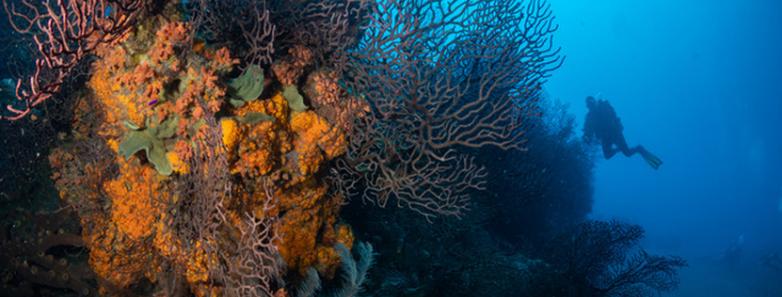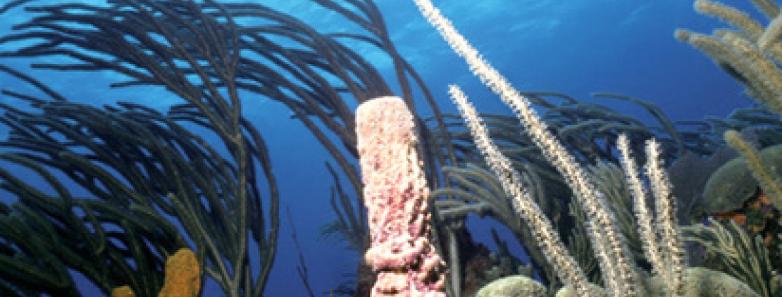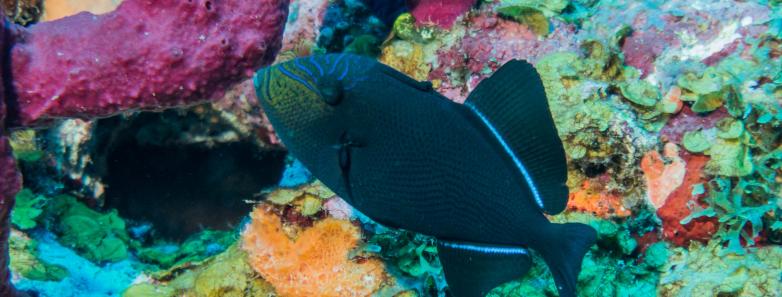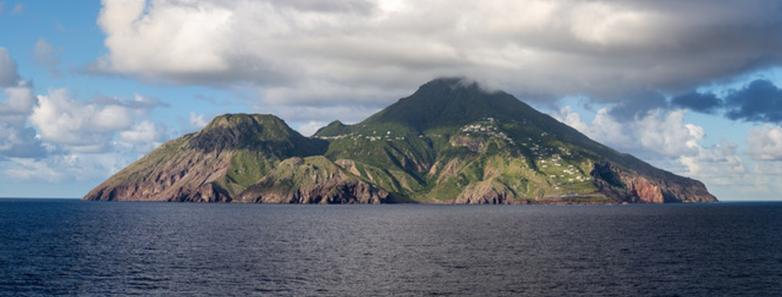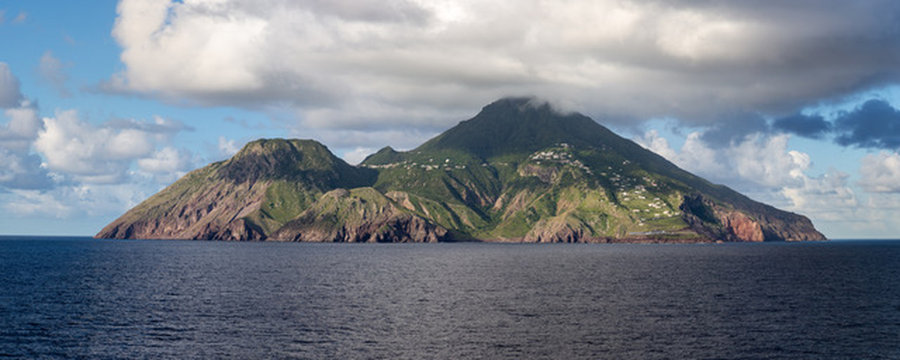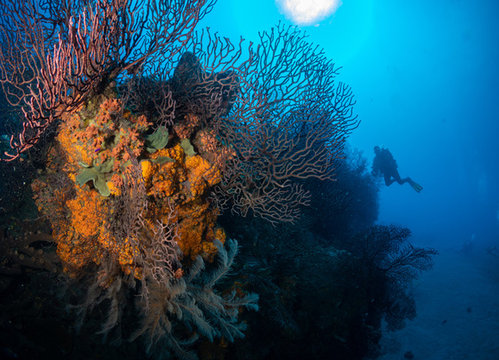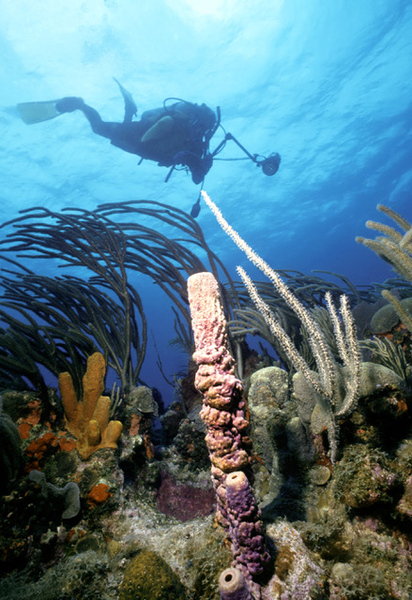SCUBA DIVING IN st Kitts, saba, & St eustatius
saba, st Kitts & st eustatius scuba DIVING HIGHLIGHTS
Year-round diving is available throughout these small but intriguing volcanic dive environments. Divers will encounter an abundance of diverse and thriving marine life across relaxed, uncrowded dive sites in calm waters. All experience levels are welcome to scuba dive St Eustatius' unique historical dive sites, St Kitts' reefs and wrecks, and Saba's marine park.
JUMP TO:
Marine Life & Environment - Top Dive Spots - Diving Conditions
How to Get There - How to Dive Saba and St Kitts - Best Time to Dive
Saba, St Kitts & ST EUSTATIUS scuba DIVing RESORTS/LIVEABOARDS
Scuba diving in St Kitts, St Eustatius, and Saba is predominantly resort-based although there is one liveaboard, Caribbean Explorer II, that splits its itineraries between St Maarten and Saba & St Kitts.
Scuba diving tends to be via small, independently-owned dive shops, such as Scubaqua on St. Eustatius.
INTRO TO scuba diving in st kitts, ST EUSTATIUS & saba
Located in the eastern Caribbean Sea, the four islands of Saba, St Eustatius, St Kitts, and Nevis lie in line northwest to southeast and form part of the Leeward Islands of the Lesser Antilles. While Saba and St Eustatius belong to the Netherlands and St Kitts and Nevis are a country of the British Commonwealth, the islands are often dived together and share similar geographical and ecological traits.
Saba
Although the smallest island, Saba boasts almost 30 dive sites around its rocky coastline. Volcanic origins make for fascinating underwater topography and far fewer tourists mean often empty dive sites and a pristine dive environment. The waters around Saba are protected within Saba Marine Park which extends 200 feet (60 m) below the surface and covers an area of approximately 1,300 hectares.
St Eustatius
Over 60 dive sites in St Eustatius' crystal clear waters provide access to everything from wrecks and an ancient city wall to turtles, sharks, rays, and an abundance of reef fish. Protected as part of the St Eustatius National Parks system, diving must be with an approved center and is carefully controlled to preserve this treasured environment.
St Kitts
While St Kitts hosts more tourists than Saba or St Eustatius, visitor numbers are still far lower than other Caribbean destinations. Subsurface scenery rivals topside for rich and colorful reefs and some fascinating wrecks to explore.
Nevis
The least-dived of the four islands, Nevis nonetheless offers access to the beautiful coral atoll, Monkey Shoals, as well as some unique thermal vents.
WHEN TO GO scuba diving in st kitts, ST EUSTATIUS & saba
Scuba diving in St Kitts, St Eustatius and Saba is great year-round with air and water temperatures remaining fairly constant throughout the seasons. For a quieter experience, consider St Eustatius scuba diving, where the dive sites remain uncrowded due to the island not posessing a cruise ship port.
Back to Menu
saba, st Kitts & St eustatius scuba DIVING INFORMATION
MARINE LIFE & PHOTOGRAPHY SUBJECTS
Many of the ecosystems around the fours islands consist of stretches of volcanic rock encrusted with hard and soft corals, sponges, and other tunicates. There are few true reefs, although the channel between St Kitts and Nevis is home to a coral atoll. Pinnacles boast large gorgonian sea fans and huge barrel and chimney sponges at deeper sites and elkhorn coral gardens can also be found.
Species of shark commonly found in these waters are Caribbean reef sharks, black-tip reef sharks, and nurse sharks, however, hammerheads, tiger sharks, and bull sharks are also occasional visitors.
Marine animals you can expect to spot diving Saba and St Kitts include:
- Nassau grouper
- Horse-eye jack
- Great barracuda
- Wahoo
- Tarpon
- Green turtle
- Hawksbill turtle
- Bottlenose dolphin
- Wrasse
- Blue tang
- Chromis
- Surgeonfish
- Parrotfish
- Triggerfish
- Angelfish
- Snapper
- Lizardfish
- Garden eel
- Flying gurnard
Other rare spots include whale sharks, manta and eagle rays, longsnout seahorses, and frogfish.
For another volcanic destination with fascinating underwater topography, check out our Hawaii diving guide.
DIVING CONDITIONS
- Water temperature: 79-83oF (26-28oC) throughout the year.
- Visibility: Up to 100ft (30m).
- Depth Range: Most sites are shallow, around 60 feet (18m).
- Diving Difficulty: Suitable for beginners and snorkelers.
BEST DIVE SITES
Here are some of the top dive sites in Saba, St Eustatius, and St Kitts:
Man o' War Shoals, Saba
Off the southwest corner of Saba, Man o' War comprises two shallow pinnacles covered in life. With a maximum depth of 72 feet (21 m), diving here is suitable for all levels, and visitors can discover an abundance of corals and sponges, crabs, lobsters, and other crustaceans, rays and sharks, and even the occasional frogfish.
Tent Reef, Saba
This wide and sprawling site offers a variety of ecosystems to explore including a vertical wall, coral reef system, volcanic boulder fields, and a shallow plateau. Marine life encounters abound with huge turtles and sleeping nurse sharks, a plethora of small reef fish, and a good chance of spotting a Caribbean reef shark.
Charles Brown Wreck, St Eustatius
Sunk as an artificial reef in 2003, the Charles Brown is a 327 foot (100m) long cable-laying vessel, and one of the island's most popular dives. With depths between 600 and 100 feet (18 and 31 m), she offers both novice and experienced wreck divers a great experience. The hull and superstructure are covered in gorgonians and sponges while schooling jacks and barracuda create a constantly moving backdrop. The wreck itself is home to many angelfish, yellow-headed jawfish, and turtles, while reef sharks patrol the edges of visibility.
BEST TIME TO go scuba DIVing in St Kitts, ST EUSTATIUS & saba
St Eustatius, Saba, and St Kitts' tropical climate means there is little variation in air and water temperatures throughout the year. The summer enjoys topside temperatures of around 89oF (32oC) and in the winter months, this can drop to 82oF (28oC). Summer is also the rainy season and brief daily showers are common however, this rarely disrupts diving.
TRAVEL INFORMATION
HOW TO GET TO saba, st Kitts & ST EUSTATIUS
To visit Saba and St Eustatius it is easiest to fly internationally into St Maarten's Princess Juliana International Airport (SXM) from the majority of US east coast cities. Then take a regularly-scheduled island-hopper flight or join the liveaboard that visits Saba and St Kitts.
To reach St Kitts, fly into Robert L. Bradshaw international AIrport (SKB) and Nevis is a 45-minute ferry journey from St Kitts.
HOW TO DIVE ST EUSTATIUS, St Kitts & saba
Scuba diving and snorkeling within the protected waters of Saba and St Eustatius must be done with a locally approved guide and there are a couple of local dive operators on each island who can facilitate day trips. Dives tend to be from small boats or straight from the shore and operators offer anything up to four days per day.
OTHER THINGS TO DO IN saba, st Kitts & ST EUSTATIUS
Being volcanic in origin, there are no proper beaches to relax at, rather the majority of the coastline is cliff and rocky shore. With that said, the beauty of the islands isn't lost, thanks to their mountainous terrain, fascinating flora, and unique panoramic views. Take a day to hike in the national park areas around volcanic craters and discover many bird and reptile species. Learn about the history of the islands on cultural tours, taste the local flavors, and enjoy music played by friendly locals.
Back to Menu
OTHER USEFUL INFORMATION
Practical INFORMATION
- Currency: Saba and St Eustatius use US Dollars (USD), St Kitts and Nevis use Eastern Caribbean Dollars (XCD), but US Dollars are widely accepted.
- Language: English, although Dutch is the official language of Saba.
- Time Zone: Atlantic Standard Time (GMT-4).
- Electricity: Saba and St Eustatius 110V, St Kitts and Nevis 230V110V.
Back to Menu
GOT QUESTIONS? READY TO BOOK?
Call us today at +1-310-915-6677 or email us info@bluewaterdivetravel.com
And let us book your dream vacation!

